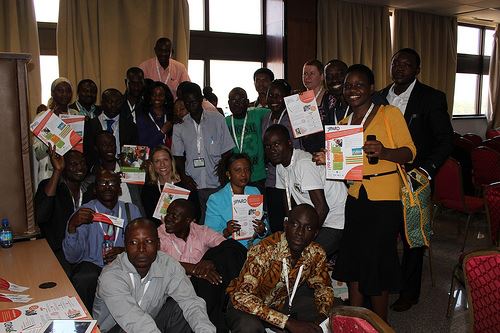
With over 40 young professionals directly supported to attend the 2013 Africa Agriculture Science Week, YPARD hosted an event celebrating what young people have done on the continent in AR4D and examining how they can work more strongly together.
The side event brought together YPARD members and those supportive of youth and agriculture issues, to share experiences of youth-led country activities and examine the way forward in engaging youth actions and perspectives through the network. While the YPARD regional networks are relatively new, they offer great scope in helping to rebuild interest and excitement among young Africans in agriculture and agricultural opportunities, a critical need in a region where 70% of the population is under the age of 30. YPARD’s Global Coordination Unit is directly hosted and supported by GFAR Secretariat.
Addressing the needs of women and youth were the focus of a further session, organized by FARA and YPARD Africa. The session contained a range of inspiring presentations from young entrepreneurs on how they had turned their passion for agriculture into thriving agri-businesses, sometimes even going against their families’ wishes to do so. Mark Holderness spoke on the role of the Gender in Agriculture Partnership (GAP), the rapidly growing collective movement that is mobilizing international actions and support for gender equity in agriculture. The session concluded that to create an enabling environment for women and youth, decision makers need to involve women and youth in both policy dialogues and implementation.
Advocacy is required to challenge gender social and cultural norms, and reflect the accompanying changes in attitudes and conduct in institutions. This requires strategic alliances and new linkages between academia, research institutions, private sector, media and communities. Affirmative action policies on commodities for youth are required to enable them to get into agriculture and mentorship to help them develop viable businesses.
Young Social Reporters
Following on from the process model developed in GCARD2, GFAR helped support processes led by FARA, with CGIAR, YPARD and CTA, to train and involve young social media reporters in disseminating news and information about the Conference proceedings. The young reporters were trained through the pre-conference in a joint programme organized by FARA, CGIAR and CTA and then produced a wide range of blogs and social media messages with their perspectives on the events, enabling many who were not in Accra to receive news of the discussions and take an active part via social media and the internet. This process greatly increased the reach and impact of the FARA AASW, as seen in the detailed report here.
